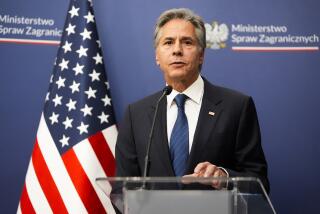Russians Jail Journalist Working in War Zone
- Share via
MOSCOW — Russia said Friday that it had detained a journalist working for the U.S.-funded Radio Liberty in Chechnya but that he might be released in a few days.
Interior Ministry spokesman Oleg Aksyonov said Andrei Babitsky was being held at a jail in the breakaway region because “he lacked proper documents and because of information he allegedly spent time with illegal armed groups.”
“After some necessary formalities he may be released. . . . I think he will most likely be released [soon],” Aksyonov said.
Under Russian law, detainees can be held for a limited time before being charged with a crime.
Interfax news agency earlier had quoted a source in Russia’s security forces as saying Babitsky already had been charged with “taking part in an illegal armed formation,” but that report could not be confirmed.
Savik Shuster, head of Radio Liberty’s Moscow bureau, said the station had requested help from international organizations in securing Babitsky’s release.
“This is no longer Russia’s internal affair only,” he said.
Radio Liberty and its twin station, Radio Free Europe, were set up by the U.S. government to beam news reports to the former Soviet Union and its Eastern European satellites.
The station’s president, Thomas Dine, said in a statement that he was sure Babitsky had not violated any Russian laws while working in Chechnya. He said the station would do all it could to secure his immediate release.
State Department spokesman James P. Rubin said Wednesday that the United States would raise the issue with Russian officials and was concerned in general about the safety of journalists in Chechnya.
Radio Liberty reported Babitsky missing Wednesday. His colleagues said he had last contacted them Jan. 15 from Grozny, saying he was ready to return to Moscow in a few days.
Sergei V. Yastrzhembsky, Russia’s new official spokesman concerning Chechnya, said Wednesday that he had no information about Babitsky being held by Russian forces, but Babitsky’s security could not be guaranteed because he was not accredited to cover the conflict.
Babitsky was one of the few correspondents to report from guerrilla-controlled parts of Grozny. The Russian military has exercised tight control over journalists in the war zone.
Russian troops struggled Friday to push closer to the center of the breakaway region’s capital, Grozny, despite rising casualties.
Acting Russian President Vladimir V. Putin, whose popularity has been built on early successes in the Chechen campaign, at the funeral of a general in St. Petersburg swore that his country would not let itself be torn apart.
“This is the way it has always been throughout our history,” he told thousands of mourners for Gen. Mikhail Malofeyev, killed Jan. 18 in fighting in Grozny.
“Whenever Russia weakened, diabolic forces appeared and tried to tear her to pieces. . . . But they never succeeded because ordinary Russians--soldiers or civilians--stood up for their motherland against them,” he said in an impassioned speech.
The army has said Malofeyev, 44, died urging Interior Ministry troops to fight on in the face of stiff rebel opposition.
But Chechen President Aslan Maskhadov was also defiant in telling his men to stand firm until Feb. 23, the anniversary of mass deportations under Soviet dictator Josef Stalin.
“Not one step back,” Interfax news agency quoted Maskhadov as saying in an order to his fighters.
After four months of fighting, the Chechens have been driven back to strongholds in Grozny and in the mountains in the south, where Maskhadov is believed to have based his headquarters.
Both areas are showing fierce resistance to the Russians as the rebels take cover in underground bunkers and the warren of streets in Grozny and in the south’s steep hills and gorges.
Col. Gen. Valery L. Manilov, first deputy chief of the armed forces’ general staff, said losses had been rising at a faster rate in recent days.
He told a news conference that 873 soldiers had been killed since fighting in the region erupted in August.
Combined with losses among Interior Ministry troops, which keep separate figures, the toll is well greater than 1,000, averaging about 20 per day as fighting has worsened since the new year.
More to Read
Sign up for Essential California
The most important California stories and recommendations in your inbox every morning.
You may occasionally receive promotional content from the Los Angeles Times.










